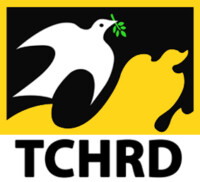A Tibetan political prisoner was released on Tuesday, 27 October from a prison in Xining, the capital of Qinghai Province. Kelsang Sonam was released a year prior to the completion of his full prison sentence, according to the court release order.
Kelsang Sonam returned home to a warm welcome from family, friends and relatives in his hometown of Arig in Dola (Ch: Qilian) County in Tsojang (Ch: Haibei) Tibetan Autonomous Prefecture, Qinghai Province
Kelsang Sonam was arrested and sentenced to ten and a half years in prison for ‘revealing state secrets’ in 2006. The ‘state secret’ that he revealed to the outside world was an appeal letter to the UN written by his friend Dolma Kyab while the latter was in prison.
After his arrival home after release, he was welcomed by local Tibetans and his friend Dolma Kyab, who was also released in early October after serving ten and a half years in prison.
A source informed TCHRD that two officials from Arig Township went to Xining to receive Kelsang Sonam when he was released on 27 October. They left Xining at 9 am, reaching Dola (Ch: Qilian) County at around 2 pm. From Dola County, the officials secretly escorted him to his home.
As soon as news of his release spread, his family members, relatives and other local Tibetans came out and waited on the road to welcome him. But local Chinese officials told them that since Kelsang Sonam was coming from far away, he would not be able to reach his hometown soon. Chinese officials thus succeeded in preventing Tibetans from giving him a grand reception.
But when local Tibetans heard of Kelsang Sonam’s arrival home, they came to see him, including his friend Dolma Kyab who saw him on 28 October 2015.

A Tibetan man from Ragya (in Golog), once a prison mate of Kelsang Sonam, had this to say on his friend’s release:
“We used to look at each other’s face through the prison meshes. Through the tiny holes in the meshes, sometimes we held each other’s hands. At times, I saw him reading English texts and reciting verses of famous writers. In prison he remained defiant and was able to argue rationally. He had indomitable courage, and while attending to prison work, he used to carry a bag full of books.”
Similarly, Dhondup Wangchen, who was imprisoned for making a documentary film, Leaving Fear Behind, had this to say about Kelsang Sonam:
“We both met in prison. He was a brave and courageous man.”
Sentencing Kelsang Sonam to prison for sending the UN appeal letter on behalf of his imprisoned friend Dolma Kyab is a grave violation of basic human rights. Such an act violates the provisions of the Chinese constitution and international human rights law, all of which protect the right to peaceful expression.
According to article 111 of China’s criminal law, people accused of ‘revealing state secrets’ shall be sentenced between 5 to 10 years. However, in serious cases, one could be sentenced to over 10 years or/and life in prison.
In recent years, the Chinese court sentenced former Chongqing police chief, Wang Lijun, to 15 years in prison for revealing state secrets. Compared to Wang Lijun’s, who tried to seek refuge in a US consulate, Kelsang Sonam’s effort to release an appeal letter on behalf of an imprisoned friend should have been given some leniency. Unfortunately, both of them received almost equally harsh imprisonment. This shows that Tibetans in the People’s Republic of China are ethnically discriminated against and are not treated equal in the eyes of the law, as promised in the constitution.
Kelsang Sonam (pen name: Gang Pel), 34, hails from Arik Township of Dola County, Tsojang (Ch: Haibei) Tibetan Autonomous Prefecture, Qinghai Province. He is the oldest of the four brothers in his family. At a very young age, he became a monk at Gaden Chopheling monastery in Arik, where he trained himself in Buddhist prayer rituals. Later he joined the nearby Kumbum and Rongwo monasteries, where he studied Tibetan grammar, poetry and so on. At Xining, he also studied, on the sides, English language.
In 2003, Kelsang Sonam came to India and studied for a year at the Tibetan Transit School near Dharamsala. After more than a year at the Transit School, he returned to Tibet. Not long after he reached Tibet, he was arrested and imprisoned.
